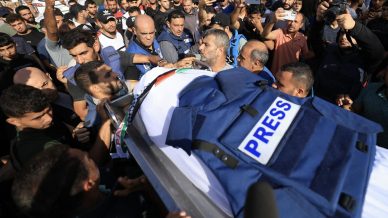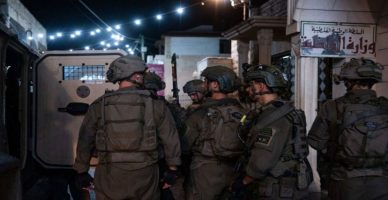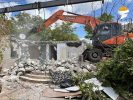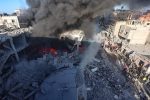In order to understand the status of Jerusalem in Islam one must refer to the basic Islamic sources namely the Holy Qur’an and the Sunna (the sayings and/or actions by Prophet Muhammad peace be upon him) with their respective supporting text.
The Holy Qur’an:[1] There are many verses (ayat) in various chapters (surahs) that give an indication as to the status of Jerusalem in Islam notably Surah XVII entitled Al-Isra’ (The Journey by Night) verse 1 wherein Prophet Muhammad peace be upon him ascended to Heaven in 621 CE (Common Era). Moreover the Prophet peace be upon him has said: “Saddles should not be prepared except for three mosques—Al-Haram Mosque (in Mecca) my mosque (in Medina) and Al-Aqsa Mosque (in Jerusalem).” The Prophet peace be upon him added: “Prayers in Al-Haram Mosque are equal to 100000 prayers; in my mosque 1000; and in Al-Aqsa 500.” In another incident at the time of the Prophet Abu Thar (may Allah be satisfied with him) asked Prophet Muhammad peace be upon him “Which mosque had been built first? The Prophet replied: Al-Haram then Al-Aqsa was built 40 years later.” In another Hadith (a report conveying the sayings actions or the approvals of Prophet Muhammad peace be upon him) Abu Umama Al-bahily said that Prophet Muhammad peace be upon him said: “There are still a group of Muslims victorious by Right and superior to their foes until the Orders of Allah come. When asked where are they the Prophet replied: In Jerusalem and its neighbourhood.”
These aforementioned texts clearly show that Al-Aqsa Mosque is the location of the ascent of Prophet Muhammad peace be upon him; the first kiblah for Muslims; one of the three holy mosques to be visited; the second mosque to be built on the globe; and a holy and sacred place where the reward for good deeds and actions are multiplied and sins are forgiven.
Owing to its holiness and status Muslims consider Jerusalem a holy shrine and a blessed place. They prepared their horses to visit this holy place and pray there; they would begin their pilgrimage from this place; and they have taken care of it throughout history. The Second Righteous Caliph Omar ibn Al-Khatab began his pilgrimage from Al-Aqsa as well as Sa’ad ibn Abi Waqqas the leader of Al-Qaessia Battle as well as other Companions namely Abdallah ibn Omar Abdallah ibn Abbas and Mahmoud ibn Al-Rabe’ Al-Ansari Al-Khazraji. Furthermore many Companions and Fiqh (knowledge of the rulings of Islamic law which are extracted from the legislative sources) scholars visited Al-Aqsa and some of them remained there because of its holiness which in turn had a great influence on Islamic culture and ideology. Some of the Companions and Fiqh scholars (1) were Abu Obeideh ibn Al-Jarrah Safia bint Huyay (one of the wives of the Prophet peace be upon him) Ma’ath ibn Jabal Bilal ibn Rabah (the Prophet’s Mu’adhan who refused to make the Adhan [call to prayer] after the Prophet had died until Jerusalem was conquered]) Eyad ibn Ghneim Abdallah ibn Omar Khaled ibn Al-Waleed Abu Thar Al-Ghafari Abu Al-Darda’ E’weimer Ubadeh ibn Al-Samet Salman Al-Faresy Abu Mas’oud Al-Ansari Tameem Al-Dary Umr ibn Al-A’as Abdallah ibn Salam Sa’id ibn Zeid Murra ibn Ka’ab Shaddad ibn Aws Abu Hureira Abdallah ibn Umr ibn Al-A’as Mu’awia ibn Abi Sufian Awf ibn Malek and Abu Jum’a Al-Ansari. Moreover numerous followers and great scholars visited and stayed in Jerusalem including such individuals as Malek ibn Dinar Oweis Al-Qarny Ka’ab Al-Ahbar Rabe’a Al-Adaweya Al-Awza’e Sufian Al-Thawry Ibrahim ibn Adaham Muqatel ibn Sufian Al-Laith ibn Sa’ad Wakee’ ibn Al-Jarrah Al-Imam Al-Shafe’e Abu Ja’afar Al-Jarashy Beshr Al-Hafy Thawban ibn Yamrud (2) Thunoon Al-Masry Salim ibn Amer (3) Al-Sary Al-Saqty Bakr ibn Sahl Al-Demiaty Abu Al-Awam (the mu’dhan in Jerusalem) Salama Al-Muqdes Al-Dareer Abu Al-Faraj Abdelwahed Al-Hanbaly Al-Imam Al-Ghazaly Al-Imam Abu Bakr Al-Tartoush Al-Imam Abu Bakr Al-Araby Abu Bakr Al-Jurjany (4) Abu Al-Hasan Al-Zahry and many others. On the other hand many caliphs visited Jerusalem such as Umar ibn Al-Khatab Mu’awiah ibn Abi Sufian (5) Abdil-Malek ibn Marwan Umar ibn Abdil-Aziz Al-Walid ibn Abdil-Malek Sulaiman ibn Abdil-Malek (who stayed in Jerusalem for a long time and was about to take it as a capital instead of Damascus) Abu Ja’far Al-Mansur Khalif Al-Mahdi and many other Ayyoubi Mamlouki and Ottoman caliphs as well.
Furthermore several caliphs used to clean the Dome of the Rock and sprayed it with rose water by themselves namely Al-Thaher Beibars (6) Al-Malek Al-Adel Zein Al-Deen Katbugha Al-Mansoury Al-Malek Al-Naser Moh’d ibn Qalawoon and his brother Sultan Hassan Al-Malek Al-Thaher Barqooq Al-Malek Al-Ashraf Bersbye Enal and Qaitbye Sultans Suleiman Al-Qanouny Mahmoud II Abde-Majeed Abdel-Aziz Abdel-Hamid II as well as many others (7). Consequently there is an intimate connection between the Holy Shrine in Mecca and Al-Aqsa Mosque because Abraham the Father of all Prophets (peace be upon them all) had built the Kaaba in Mecca but he was buried in Hebron near Jerusalem.
Muslims strongly believe that Jerusalem and its surrounding neighbourhood is holy land which can never be given up because it is a part of their faith. Muslims are the only people who believe in all the Prophets (peace be upon them all) from the time of Adam through to Prophet Muhammed (peace be upon him). There is not even one statement in either the Qur’an or Sunna that attributes any sins or misdeeds committed by any of them. In addition a Muslim’s faith will not be perfect unless they believe in all of the Prophets (Surat Al-Baqarah [The Cow] verses 136 and 285 as well as tens of verses in the Holy Qur’an which honour all of them because they have all brought the same message to mankind) (8). Thus all Muslims are obligated to defend all religious places wherever they are because Muslims are the best and most honourable nation ever created for Mankind (Surat Al-Imran [The Family of Imran] verse 110; and Surat Al-Hajj [The Pilgrimage] verse 78). Actually this a great responsibility compared with the Jews’ attitude toward the Prophets throughout history; they have been described in the Holy Qur’an as well as in both the Old and New Testaments as the murderers of Prophets the Sons of Serpents the Stray or Blind and the Cursed and Condemned because of their disbelief in many of the Prophets. In this light it is obvious that they would be unable to carry out this mission.
God said: “I will destroy Jerusalem and the Yahuda and I will give them up for their enemy because they had bad conduct” (9 and 10) and “God has made this people blind to truth” (11). His guides went astray and became rude to the poor and orphans (12). It has been evidenced in the Bible that the Jews murdered several Prophets namely Hezeqial Esh’ia Bin Amous Ermia Zachariah and his son Yahya (Jonah) (13). They tried to murder both Essa (Jesus) and Mohammed (peace be upon them both). Moreover it is stated in the Bible that the Prophet Jacob (peace be upon him) decided to wipe out the Canaanites even though they believed in Judaism (14) but this is untrue because this would never be done by a Prophet. Then it has also been stated that all people are dogs and servants for the Jews who say that they did not occupy any land because it is their legacy which had been usurped by others (15).
The Talmud states that all nations are cursed and condemned except the Jews who are honourable and have the right to capture whatever the non-Jews have because they deserve to be murdered. As a result how can such people be trusted to defend and protect the holy places and the human legacy (Surat Al-Baqarah verse 61) and who has more right to do so Muslims or Jews?
Muslims have always viewed Jerusalem as a holy place which must be defended because it is similar to Mecca in its holiness and has been for more than 14 centuries. These places must be protected given that Abraham the Father of all Prophets (peace be upon them all) had built the Kaaba in Mecca and thereafter moved to Palestine where he passed away and was buried in Hebron near Jerusalem. Muslims will never forget that they used to pray toward Jerusalem in the early stages of Islam before Allah ordered it to be changed to the Holy Shrine in Mecca. There is a mosque in Medina that still has the two directions (one pointing toward Jerusalem and one towards Mecca) namely Al-Qiblatain Mosque as real evidence for this intimate connection between Jerusalem and Mecca. On the other hand Muslims still consider the places where God spoke to Moses; where David and Soloman repented to God and where the mountains and birds had been put in their service; where Issac asked his sons to bury him; and where Christ was born spoke in the cradle the banquet was descended from the Heavens where he was raised to the Heavens and where Mariam passed away (16) as holy places to be guarded. This is the real and sincere attitude of all Muslims toward Jerusalem which shows their appreciation and respect for all Prophets and their holy places as an immense historical and religious responsibility. On the contrary to this honourable attitude the Jews have been rude and aggressive toward all Prophets (peace be upon them all). They have changed and deformed all the real teachings and texts of the Bible. Muslims all over the world feel this responsibility because Muslims are ordered to defend and protect all of the Prophets’ legacy and heritage and they must fight any Jewish attempt to deform and forge the truth and facts about these human issues.
Endnotes
1. Agreed upon.
2. Reported by Ahmad.
3. Agreed upon.
4. Reported by Ahmed in his Musnad.
5. Refer to Al-Uns Al-Jaleel 1/260-66 Moh’d al-Faham Muslims and the Restoration of Jerusalem p. 34; then it was reported by Al-Azhar that it is allowed to embark on a pilgrimage before the assigned place.
6. Ibn Sa’ad Al-Tabaqat Al-Kubra 7/242 Beirut.
7. Al-Tabaqat 7 p. 464.
8. Al-Uns Al-Jaleel 1 p. 424.
9. Ibn Sa’ad Al-Tabaqat Al-Kubra 7/406.
10. Dr. Rashad Al-Imam Jerusalem in the Middle Ages p. 62.
11. Find out about this fact in the verses 83-90 in Surat Al-An’am (The Cattle).
12. Kings II 21:12-15.
13. Kings II 21:16-17.
14. Esha’ia 6:8-13.
15. Esha’ia 9:13-17.
16. Nabil Shabib Al-Haq wa Al-Batel p. 18 Achen Germany.
17. Maccabian II.
18. Maccabian II.
19. Al-Uns Al-Jaleel 1/239.















